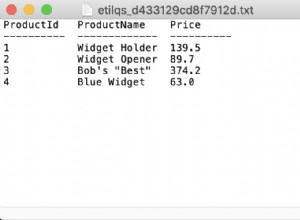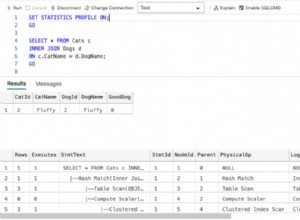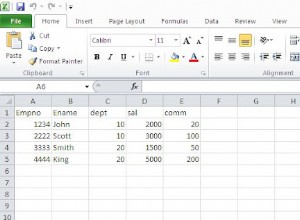Asumsikan Anda memiliki produk dan kategori. Seorang klien mengatakan bahwa perlu menggunakan proses bisnis lain untuk kategori dengan nilai peringkat lebih tinggi dari 50. Anda memiliki pengalaman yang solid dan Anda memahami bahwa besok nilai ini mungkin berbeda – 127,37. Karena Anda ingin menghindari situasi ini, Anda menulis kode dengan cara berikut:
public class Category : HasIdBase<int>
{
public static readonly Expression<Func<Category, bool>> NiceRating = x => x.Rating > 50;
//...
}
var niceCategories = db.Query<Category>.Where(Category.NiceRating);
Sayangnya, ini tidak akan berfungsi jika Anda perlu memilih produk dari kategori yang sesuai. NiceRating memiliki tipe Expression
Jadi, kita perlu mengubah Expression
public class Product: HasIdBase<int>
{
public virtual Category Category { get; set; }
//...
}
var niceProductsCompilationError = db.Query<Product>.Where(Category.NiceRating); Untungnya, ini cukup mudah!
// In fact, we implement a composition of statements,
// which returns the statement matching the composition of target functions
public static Expression<Func<TIn, TOut>> Compose<TIn, TInOut, TOut>(
this Expression<Func<TIn, TInOut>> input,
Expression<Func<TInOut, TOut>> inOutOut)
{
// this is the X parameter => blah-blah. For a lambda, we need null
var param = Expression.Parameter(typeof(TIn), null);
// we get an object, to which this statement is applied
var invoke = Expression.Invoke(input, param);
// and execute “get an object and apply its statement”
var res = Expression.Invoke(inOutOut, invoke);
// return a lambda of the required type
return Expression.Lambda<Func<TIn, TOut>>(res, param);
}
// add an “advanced” variant of Where
public static IQueryable<T> Where<T, TParam>(this IQueryable<T> queryable,
Expression<Func<T, TParam>> prop, Expression<Func<TParam, bool>> where)
{
return queryable.Where(prop.Compose(where));
}
// check
[Fact]
public void AdvancedWhere_Works()
{
var product = new Product(new Category() {Rating = 700}, "Some Product", 100500);
var q = new[] {product}.AsQueryable();
var values = q.Where(x => x.Category, Category.NiceRating).ToArray();
Assert.Equal(700, values[0].Category.Rating);
}
Ini adalah implementasi dari komposisi pernyataan di LinqKit. Namun, Entity Framework tidak berfungsi dengan InvokeExpression dan menampilkan NotSupportedException. Tahukah Anda bahwa LINQ memiliki kekurangan? Untuk mengatasi batasan ini, di LinqKit kami menggunakan metode ekstensi AsExpandable. Pete Montgomery menjelaskan masalah ini di blognya. Versi Predicate Builder-nya berfungsi baik untuk IEnumerable
Ini kodenya apa adanya.
public static class PredicateBuilder
{
/// <summary>
/// Creates a predicate that evaluates to true.
/// </summary>
public static Expression<Func<T, bool>> True<T>() { return param => true; }
/// <summary>
/// Creates a predicate that evaluates to false.
/// </summary>
public static Expression<Func<T, bool>> False<T>() { return param => false; }
/// <summary>
/// Creates a predicate expression from the specified lambda expression.
/// </summary>
public static Expression<Func<T, bool>> Create<T>(Expression<Func<T, bool>> predicate) { return predicate; }
/// <summary>
/// Combines the first predicate with the second using the logical "and".
/// </summary>
public static Expression<Func<T, bool>> And<T>(this Expression<Func<T, bool>> first, Expression<Func<T, bool>> second)
{
return first.Compose(second, Expression.AndAlso);
}
/// <summary>
/// Combines the first predicate with the second using the logical "or".
/// </summary>
public static Expression<Func<T, bool>> Or<T>(this Expression<Func<T, bool>> first, Expression<Func<T, bool>> second)
{
return first.Compose(second, Expression.OrElse);
}
/// <summary>
/// Negates the predicate.
/// </summary>
public static Expression<Func<T, bool>> Not<T>(this Expression<Func<T, bool>> expression)
{
var negated = Expression.Not(expression.Body);
return Expression.Lambda<Func<T, bool>>(negated, expression.Parameters);
}
/// <summary>
/// Combines the first expression with the second using the specified merge function.
/// </summary>
static Expression<T> Compose<T>(this Expression<T> first, Expression<T> second, Func<Expression, Expression, Expression> merge)
{
// zip parameters (map from parameters of second to parameters of first)
var map = first.Parameters
.Select((f, i) => new { f, s = second.Parameters[i] })
.ToDictionary(p => p.s, p => p.f);
// replace parameters in the second lambda expression with the parameters in the first
var secondBody = ParameterRebinder.ReplaceParameters(map, second.Body);
// create a merged lambda expression with parameters from the first expression
return Expression.Lambda<T>(merge(first.Body, secondBody), first.Parameters);
}
class ParameterRebinder : ExpressionVisitor
{
readonly Dictionary<ParameterExpression, ParameterExpression> map;
ParameterRebinder(Dictionary<ParameterExpression, ParameterExpression> map)
{
this.map = map ?? new Dictionary<ParameterExpression, ParameterExpression>();
}
public static Expression ReplaceParameters(Dictionary<ParameterExpression, ParameterExpression> map, Expression exp)
{
return new ParameterRebinder(map).Visit(exp);
}
protected override Expression VisitParameter(ParameterExpression p)
{
ParameterExpression replacement;
if (map.TryGetValue(p, out replacement))
{
p = replacement;
}
return base.VisitParameter(p);
}
}
}




